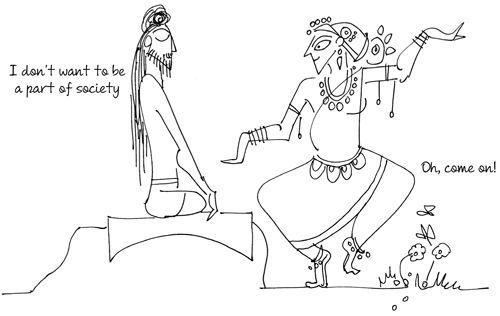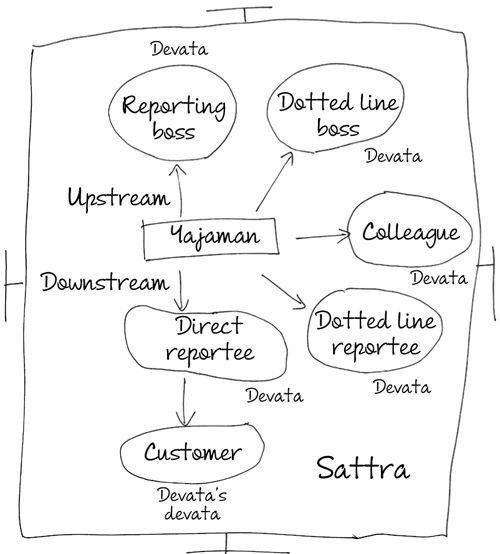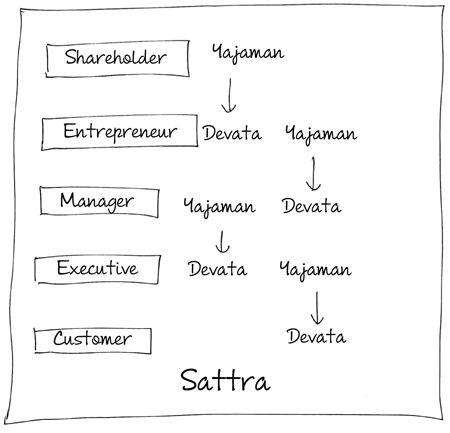Business Sutra: A Very Indian Approach to Management (24 page)
Read Business Sutra: A Very Indian Approach to Management Online
Authors: Devdutt Pattanaik

When King Dashrath's wives bear him no children and Lompad's kingdom suffers drought, both are advised to get Rishyashring to perform a yagna. Rishyashring cannot perform a yagna unless he is married and he will not get married because his father, Vibhandak, has raised him without any knowledge of women. In fact, his celibacy is suspected to be the cause of the childlessness and drought that plagues Dashrath and Lompad.
So Lompad's daughter, Shanta, is sent to the forest to seduce the young celibate sage. She spends hours with him, first pretending to be a sage herself, then gradually introducing him to the idea of gender, and finally by stirring sensual urges in him. Eventually, Rishyashring succumbs. He becomes Shanta's husband and she brings him to Lompad's city where he is welcomed with open arms. As a married sage, he conducts yagnas, one that brings rains to his father-in-law's drought-ridden kingdom, and another that grants Dashrath four sons, including Ram.

Business is about seduction. To increase market size, we have to seduce customers who have never used our product or service. To increase market share, we have to seduce customers away from the competition. Unless Rishyashring is seduced, neither Dashrath nor Lompad can have what they want.
For generations, Indian kitchens did not have pressure cookers. When they were first introduced in India, no one bought them. Although it cooked food faster and gave the cook more time to do other chores, people saw no value in a pressure cooker. They wondered what the cook would do with that extra time. Besides, experts were convinced that food did not taste as good. To change this mindset, a marketing campaign was created, which showed that a husband who loved his wife would buy her a pressure cooker, thereby making her life a little less stressful. And so went the seduction. Wives began to see pressure cookers as proof of their husbands' love. The sale of pressure cookers rose phenomenally. Today, pressure cookers are considered a necessity, hardly a luxury. Rishyashring had been seduced.
He who satisfies hunger becomes desirable
This story comes from the Buddhist Jatakas. A young lad overheard a merchant say that a good entrepreneur would find opportunity even in a dead rat. The lad picked up a dead rat and wondered what opportunity there could be in it. While he was lost in thought, a cat approached him and began trying to catch the dead rat in his hand. "Give my cat that rat and I will give you a copper coin," said the owner of the cat. The lad pocketed the coin, and realized where there is hunger there is opportunity.
He thought of the grass-cutters who had to walk deep into the forest and got very thirsty on their way back, walking as they were in the afternoon sun carrying huge bundles of grass. So he greeted them midway, and offered them water from a pot he had bought with the copper coin he earned for the rat. In exchange for quenching their thirst, he asked each grass-cutter for a bundle of grass. Consequently, every day he got a bundle of grass without actually having to cut it. This he sold in the horse market, which earned him a copper coin every day.
Days later, he went to the merchant who had got him started by commenting about opportunities being present even in dead rats. He thanked the merchant for his wisdom. Hearing his tale of success, the merchant thought, "This young man is really smart and enterprising. An opportunity that I must not lose." He made the lad his son-in-law and before long, the lad was the most prosperous merchant in town, earning great wealth by satisfying the many hungers of the marketplace.
In the jungle, all animals, both predator and prey, come to the pond to quench their thirst. Business is about becoming the water body that attracts talent, investors and customers towards us.
When the new mall opened in Poonam Colony, Jayesh, the owner of the local kirana shop that sold provisions, became very nervous. He felt he would never be able to compete with the prices in the mall. Then, he realized, that his customers had small needs: a biscuit, bottle of soda, or a packet of snacks. It was too much to make the journey to the mall for such small items. Jayesh promised home delivery, however small the order. Before he knew it, he was flooded with calls. And invariably, the orders were large. The convenience of home delivery was something everyone had got used to in Poonam Colony and the mall could not break that habit despite great pricing. Jayesh's business was safe, at least for now.

Many devatas need to be seduced
Every year, for the past six hundred years or so, in the temple of Jagannath in Puri, Orissa, a chariot of wood is made for the great chariot festival. A whole series of ceremonies precedes the building of the chariot. Worship is offered to the logs of wood, the instruments that will be used to carve it, and the carpenter who will turn the wood into the chariot. Before the satisfaction of the presiding deity, the wood, the carpenter and his instruments have to be pleased.
This behaviour is not an isolated practice. In household rituals, before the deity is worshipped, prayers and offerings are made to the implements of worship like the bell, the pot, the conch-shell and the lamp. In traditional dance performances, the dancers worship the stage, musicians, instruments and even the audience, before beginning their performance. Every link in the chain is worshipped; each one is sacred and significant.
In business, too, the yajaman depends on many devatas for his success. Each one needs to be acknowledged and paid obeisance to.
- There is the customer/consumer/client from whom the organization earns revenue.
- There is the employee through whom we get our work done.
- There is the employer who we report to, directly or indirectly, or via a dotted line.
- There are colleagues and co-workers without whose support we cannot do our task or achieve our target.
- There is the driver, doorman, office assistant and support staff who make life more comfortable.
There are devatas downstream and upstream and in lateral spaces. This presence of many devatas means that business is not merely a single yagna but a series of yagnas, or sattra. In fact, it is a maze of yagnas, each exchange interlocked with other exchanges, where the yajaman of one yagna serves as devata in another. We have to feed many devatas and many yajamans have to feed us.

If the yajaman sees the business as a single yagna, he will frown upon personal goals if they are not aligned to the organizational goal. If he sees business as a sattra, he endeavours to make the organizational goal an outcome of everyone's personal goals.
As the manager of a pharma company, Manish knows that his success depends on many people. He knows that each of these devatas has separate needs. His team members, for example, work for their salaries and their bonuses. He makes sure that their appraisals are done on time. In fact, he is one of the few area managers who does appraisals proactively and does not have to be chased by the HR department for timely submission, indicating the value he places on that process. He knows that his boss needs the target plans and achievement sheets every Monday morning; he ensures these are emailed by Sunday evening. He regularly calls the HR and finance executives, even if he has no work, as he wants to build a relationship with them. This ensures that his work gets done smoothly and usually faster than others.
Every devata has a devata of his own
In the Purans, when the devas are in trouble they turn to their father Brahma. When Brahma cannot solve their problem, he takes the devas to Vishnu. When Vishnu cannot solve the problem, Vishnu takes Brahma and the devas to Shiva. When Shiva cannot solve the problem, Shiva takes Vishnu and Brahma and the devas to the Goddess.
This is like an escalation matrix. When the problem cannot be solved at a particular level, one goes to the higher level. However, if the Goddess solves their problem, the next time the devas will bypass Brahma, Vishnu and Shiva and go directly to her. Yet, in every narrative there is no bypass. The structure is respected.
The Goddess does not really have to solve the problem of the devas. She has to solve the problem of Shiva. Why is he not able to solve Vishnu's problem? And Shiva has to solve Vishnu's problem. Why is Vishnu not able to solve Brahma's problem? Vishnu, in turn, has to solve Brahma's problem. Why is Brahma not able to solve the problem of the devas? Brahma has to figure out how to make the devas independent, so they can solve their own problems.
Every yajaman has a devata and every devata, in his capacity as yajaman, has a devata of his own. The yajaman has to solve not just the devata's issues but also figure out how to make him a better yajaman. Otherwise, there will be upward delegation and the gaze of the organization will be towards the boss, not the customer.
Felix has six people reporting to him. Each of them have ten people under them who, in turn, manage teams of about a dozen people who are client facing. Felix realized that while the tathastu of the company (revenue) came from the market, the tathastu of the employee (salary) came from the head office via the boss. Hence the gaze was typically upstream not downstream. People were more interested in boss management than customer management. To change this orientation, when he became head, Felix put the names of his six team members on a notice board in front of his desk. "You are the people who will help me succeed if I help you succeed," he told them in a team meeting. Next to each one's name he put down their individual short-term goals, first personal and then professional. Every week he would take time out to discuss these goals. As the months passed, he noticed each of his team members had similar sheets of papers on their notice boards, with the names of their respective team members. They were mimicking downstream what they were experiencing upstream. Were they being sincere or strategic? Felix did not know, but at least he ensured that his people focused a little more of their attention downstream than upstream.

Every devata's hunger is unique
All devatas are placed in a puja room. The puja room is typically located in the northeast corner of the house. Just as the rising sun of the east indicates growth, the Pole Star of the north indicates permanence or stability. Accordingly, the puja room is grounded on the paradoxical and universal desire for growth on the one hand and stability on the other.
